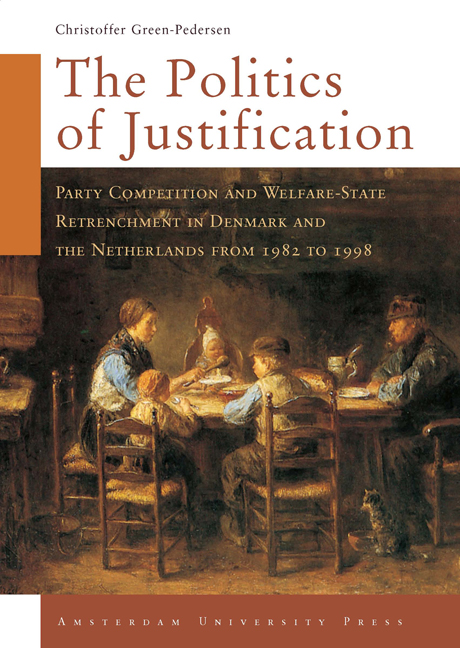 The Politics of Justification
The Politics of Justification Book contents
- Frontmatter
- Acknowledgments
- Contents
- List of Abbreviations
- 1 Introduction
- 2 From Theories of Expansion to Theories of Retrenchment
- 3 Framework for Government Choice on Retrenchment
- 4 Research Strategy and Research Design
- 5 Retrenchments in Denmark and the Netherlands
- 6 Dutch Politics and Welfare-State Retrenchment.How Party Competition Produced Consensus
- 7 Danish Politics and Welfare-State Retrenchment:The Difficulties of a Right-Wing Government and the Possibilities of a Left-Wing Government
- 8 The Evidence on Balance and some Quibbles
- 9 Party Politics Matter – Summary and Implications
- Appendix
- Summary
- Notes
- References
- Index
9 - Party Politics Matter – Summary and Implications
Published online by Cambridge University Press: 15 January 2021
- Frontmatter
- Acknowledgments
- Contents
- List of Abbreviations
- 1 Introduction
- 2 From Theories of Expansion to Theories of Retrenchment
- 3 Framework for Government Choice on Retrenchment
- 4 Research Strategy and Research Design
- 5 Retrenchments in Denmark and the Netherlands
- 6 Dutch Politics and Welfare-State Retrenchment.How Party Competition Produced Consensus
- 7 Danish Politics and Welfare-State Retrenchment:The Difficulties of a Right-Wing Government and the Possibilities of a Left-Wing Government
- 8 The Evidence on Balance and some Quibbles
- 9 Party Politics Matter – Summary and Implications
- Appendix
- Summary
- Notes
- References
- Index
Summary
This chapter starts with a brief summary of the main findings of the study. The rest of the chapter aims at discussing a number of implications of these findings at two levels. First, the implications for the scholarly debate about welfare-state retrenchment will be discussed. This includes a discussion of the prospects of generalising the insights of this study beyond the cases studied here. Second, the chapter will address the broader question about the political background for the economic ‘miracles’ in the two countries and the implications that this has for the debate about a country's ability to adjust their models of welfare capitalism to a changed economic environment, and the understanding of the dilemmas of European Social Democracy.
The main findings
The main finding of this study is evidently the importance of party politics for the development of modern welfare states. This study claims that a focus on Dutch and Danish party competition is a must if one wants to know why the Netherlands has generally carried through a larger scale of retrenchment than Denmark. The same goes for the variation over time in the two countries. One must consider how the Dutch pivot system of party competition produced a party consensus around retrenchment. This consensus allowed various Dutch coalition governments to justify retrenchment measures in the eyes of the electorate. One must also consider how, except for the years of economic crisis, the Danish bloc-system of party competition implied a political stalemate in relation to retrenchment during the right-wing bloc rule. However, once the Social Democrats regained power, a party consensus around retrenchment emerged.
If an understanding of the reasons for differences in the extent of retrenchment of the various social-security schemes is desired, the schemes’ connection to the labour market must be considered. It affects governments’ capabilities of justifying retrenchment measures in the eyes of the electorate as well as shapes government incentives for retrenchment. This factor explains why the old-age pension schemes in both countries fared the best in this period, and why the Danish disability-pension scheme fared better than both unemployment benefits and early-retirement benefits.
- Type
- Chapter
- Information
- The Politics of JustificationParty Competition and Welfare-State Retrenchment in Denmark and the Netherlands from 1982 to 1998, pp. 143 - 152Publisher: Amsterdam University PressPrint publication year: 2002


